Man Put Down His Ex-Girlfriend's Dog Without Consulting Her
Losing a beloved pet is never an easy decision, especially when faced with tough choices that involve their health and well-being. In a poignant tale of love and responsibility, a man finds himself at odds with his ex-partner over a heart-wrenching decision he had to make for their shared furry friend.
Four months after his ex-girlfriend, now working overseas, left behind some belongings and her faithful dog, James, a twelve-year-old canine companion, the man found himself in a situation no pet owner ever wishes to encounter.
Having grown close to James over the years, he took on the responsibility of caring for the aging pup. Familiar with the dog's quirks and routines, the man diligently maintained his care.
However, tragedy struck when James developed a twisted stomach, leaving him in pain. The man was faced with a costly surgical option that had no guaranteed outcome. Tearfully, he chose to spare James further suffering and opted to euthanize him—a heart-wrenching decision made with the dog's best interests in mind.
But when news reached his ex-girlfriend through her mother, it ignited an unexpected firestorm. She accused him of being a "petty asshole" and questioned his motivations behind the decision. Hurt and frustrated, he blocked her, feeling unjustly accused.
In the aftermath of this emotionally charged situation, the question arises: was he wrong for making this difficult choice? Should he have tried to involve his ex-partner in the decision, despite the logistical challenges of communication?
The ex-partner of OP ended their relationship and left behind her belongings and a 12-year-old dog for OP to take care of

The dog's old age led to a health issue; the vet warned that costly surgery might not work. Tearfully, OP chooses to let James go peacefully.
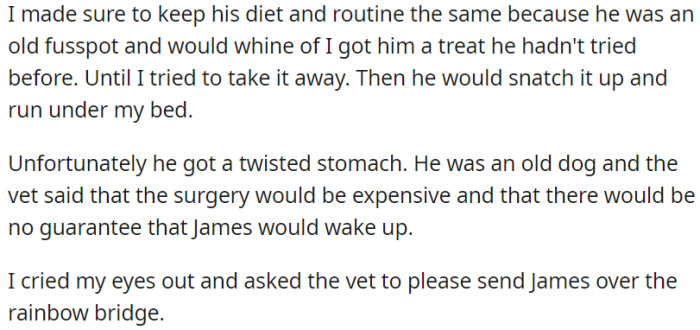
OP's ex called and accused OP of putting down the dog out of spite

Decisions regarding pets can evoke intense emotional responses, often linked to attachment theory. Research indicates that pet ownership significantly affects emotional well-being, creating bonds similar to those between humans.
A study published in the Journal of Personality and Social Psychology found that pets provide comfort, companionship, and even a sense of purpose (McConnell et al., 2011). This bond complicates situations like the one described, where one partner's unilateral decision may disregard the emotional weight for the other, leading to feelings of betrayal or loss.
The psychological principle of empathy is essential in understanding the implications of unilateral decisions. Empathy involves recognizing and validating another person's feelings, which is crucial in shared experiences like pet ownership.
Studies show that fostering empathy can lead to healthier relationships and conflict resolution (Decety & Jackson, 2004). Encouraging both partners in this situation to share their feelings openly could facilitate healing and promote a more constructive dialogue about their shared responsibilities.
The Ethics of Animal Care
Dr. Rachel Adams, an animal behaviorist at McGill University, emphasizes that decisions regarding pet care should be guided by ethical considerations and a sense of responsibility.
In this situation, the man's choice to put down the dog without consulting his ex-girlfriend raises important ethical questions about ownership and responsibility.
OP's ex's assumption that he harmed the dog out of spite is narcissistic
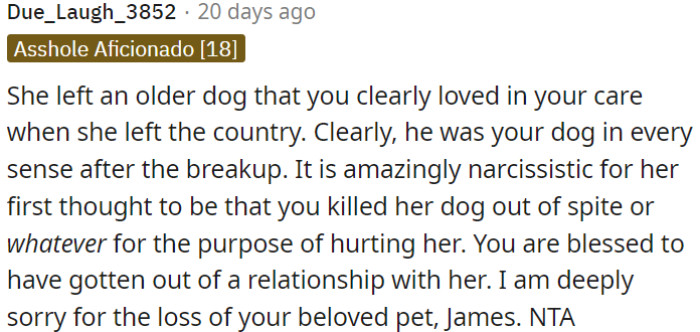
Despite the cost, OP chose a humane end for the dog instead of letting him suffer
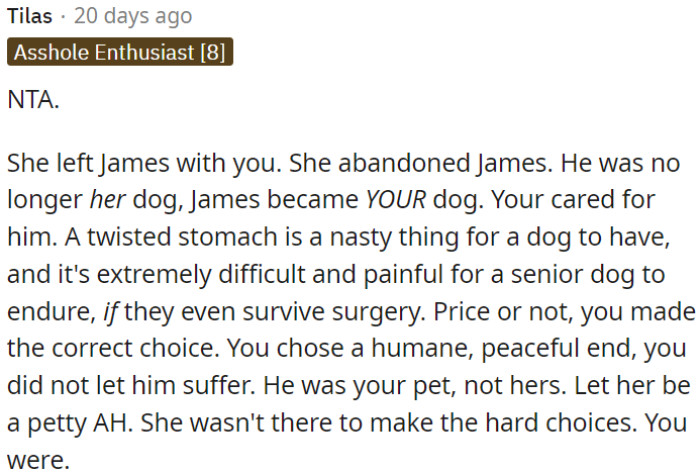
OP acted appropriately by taking care of his own dog's well-being.
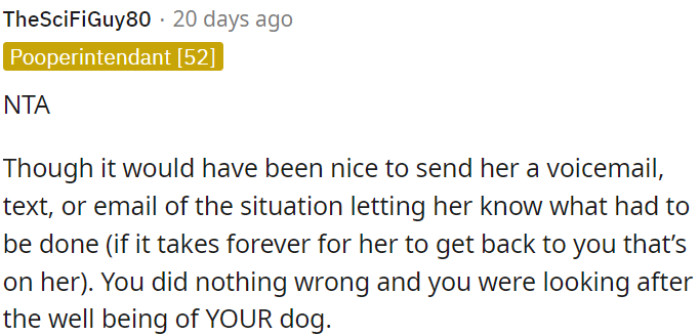
The Role of Communication in Relationships
Effective communication is crucial in relationships, especially during emotionally charged situations. According to research from the American Psychological Association, poor communication can exacerbate conflicts, leading to misunderstandings and resentment.
In this case, the man's decision to put down the dog without consulting his ex-girlfriend may reflect a breakdown in communication. Mental health professionals recommend establishing clear channels for discussing significant decisions, particularly those affecting shared responsibilities like pet care.
Research published in the Journal of Animal Ethics highlights the need for shared decision-making in pet care, as emotional bonds often complicate ownership issues.
This underscores the importance of communication in navigating pet-related conflicts, particularly when life-and-death decisions are involved.
James became OP's dog when his ex moved overseas

It was an act of mercy and love
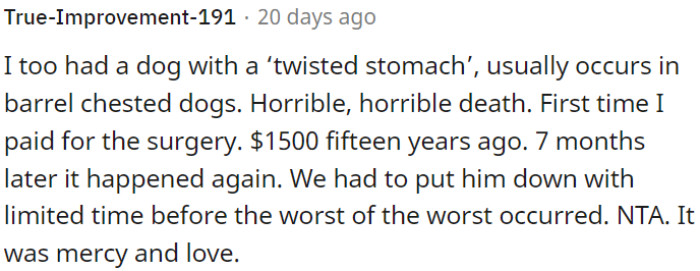
If someone abandons their dog and belongings, they lose the right to be informed about the dog's well-being
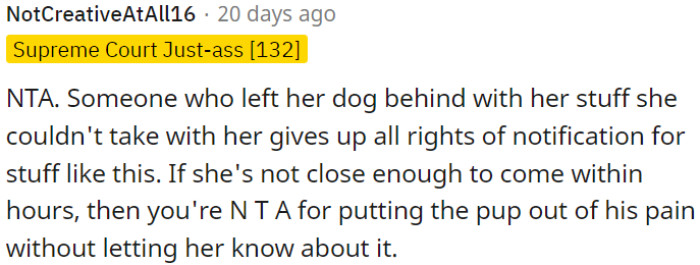
Understanding the psychology of grief can also provide insights into the situation. Pets are often viewed as family members, and losing one can trigger profound grief, akin to losing a human loved one.
A study published in the journal Society & Animals highlights that pet owners experience grief that includes intense sorrow and feelings of guilt (Thompson, 2008). The man's decision, made without consultation, may intensify feelings of loss for his ex-girlfriend, complicating her grieving process further.
Understanding Relationship Conflicts
Relationship conflicts can often arise from a lack of communication and differing expectations regarding responsibilities.
Studies in social psychology indicate that when partners do not align on expectations, misunderstandings and resentment can develop.
The dog was OP's responsibility, not his ex's; she relinquished that
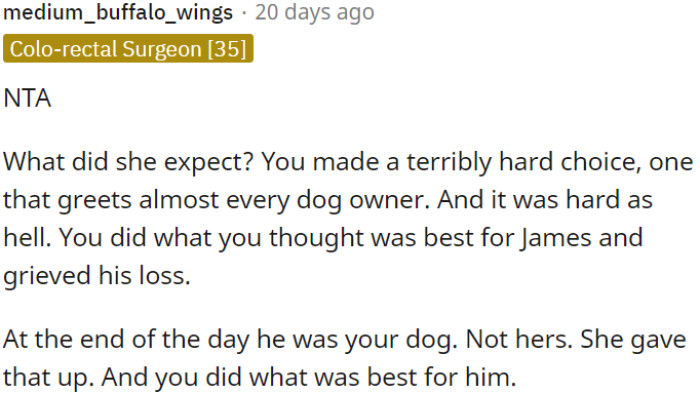
She left the dog; OP cared for him and now he is the owner

She left OP and her dog for a job, showing no care for him afterward

Navigating Emotional Turmoil
Managing emotional turmoil in relationships requires strategies to foster understanding and empathy. Clinical psychologists suggest implementing structured conversations, where both parties can express their feelings and thoughts without interruption.
Research indicates that such practices can lead to improved relational dynamics. For instance, the work of Dr. John Gottman emphasizes the importance of 'soft startups' in discussing sensitive topics, which can help prevent defensiveness and promote collaborative problem-solving.
To navigate these conflicts effectively, establishing clear communication channels is vital. Couples therapy can provide a safe space for discussing difficult topics and fostering mutual understanding.
Research shows that therapy can enhance communication skills, ultimately improving relationship dynamics.
OP acted responsibly and did his best.
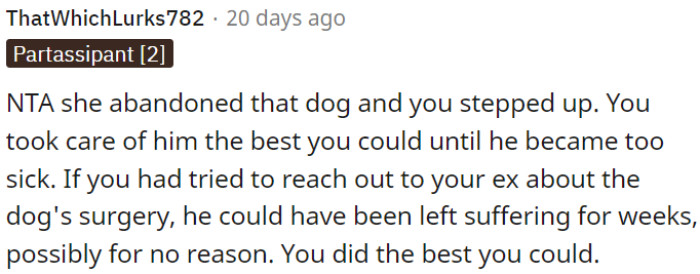
During a challenging situation involving James the dog, a closer look reveals OP's dedication to responsible care. With six years of companionship, he understood James's needs well.
Faced with a tough call due to a medical condition, he chose to relieve James's suffering. His decision wasn't about malice but about doing what was best for James.
Considering the circumstances—his ex's absence and lack of involvement—OP's responsibility for James had understandably shifted. While emotions were high, his actions were driven by practicality and compassion.
This is a good example that underlines the significance of responsible pet ownership and making tough decisions out of genuine care.
The Importance of Trust in Relationships
Trust is a fundamental component of healthy relationships, and breaches can lead to significant emotional distress.
According to research in the Journal of Family Psychology, rebuilding trust requires transparency and accountability from both partners.
Creating an environment where both feel safe to express their feelings is key to restoring trust and emotional connection.
Psychological Analysis
This situation highlights the profound emotional complexities involved in pet ownership and relationship dynamics. The man's unilateral decision to put down the dog indicates a breakdown in communication and trust.
It's crucial for both parties to engage in open dialogue to address these feelings and move toward resolution.
Analysis generated by AI
Analysis & Alternative Approaches
Understanding the ethical implications of pet care decisions is essential for navigating relationship conflicts.
Research shows that fostering open communication and trust can help partners navigate complex emotional landscapes.
Ultimately, prioritizing empathy and understanding can lead to healthier, more fulfilling relationships.
Psychological Analysis
The man's decision to euthanize the dog seems to stem from a genuine concern for the pet's welfare and an effort to end its suffering. His ex-girlfriend's reaction, on the other hand, possibly reflects a sense of loss and a struggle with control issues. This situation emphasizes the importance of clear communication, even in complex emotional circumstances.
Analysis generated by AI
In conclusion, the complexities of human-animal relationships highlight the necessity of effective communication and empathy in decision-making. Research consistently shows that unresolved grief and conflicts can lead to long-term relational strain.
Encouraging open discussions about feelings and responsibilities is crucial for navigating sensitive situations like this. By employing empathy and understanding, both individuals can work toward healing and potentially redefine their emotional connection, acknowledging the shared love for their pet while managing their personal feelings.



